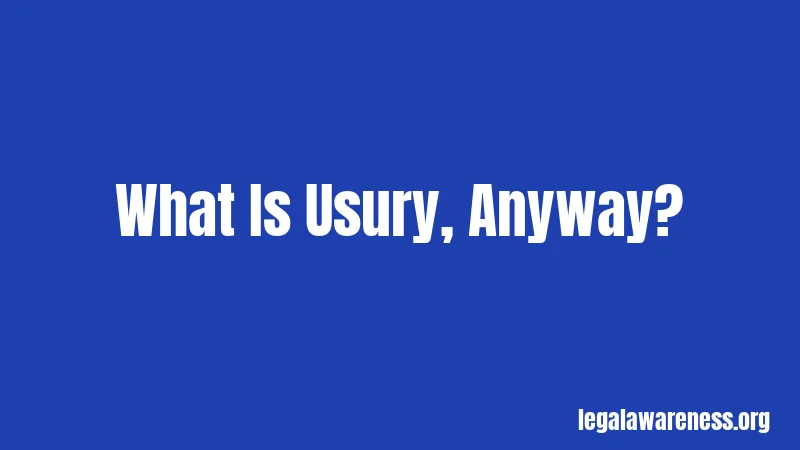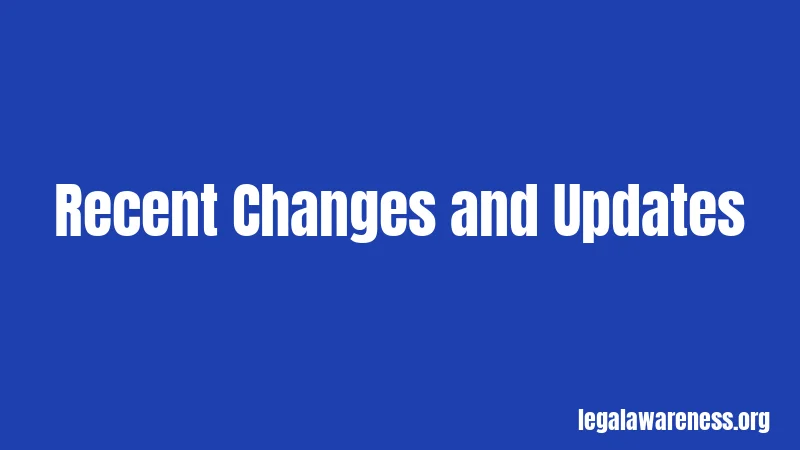Illinois Usury Laws (2026): What Interest Rates Actually Cost You
Most people have no idea that there’s a legal limit on interest rates. Seriously. But in Illinois, these rules are real, and if you’re borrowing money or lending it, you need to know them. Let’s break down exactly what you need to know about usury laws in Illinois.
Here’s the thing: usury laws exist to protect you from predatory lenders. If you’re borrowing money, you have rights. If you’re lending money, there are limits on what you can charge. Stick with me, and I’ll explain how this actually works.
What Is Usury, Anyway?

Think of usury as the practice of charging interest rates that are way too high. Basically, it’s when a lender charges more interest than the law allows. Okay, here’s where it matters: Illinois has specific rules about how much interest lenders can legally charge.
The state sets maximum interest rates. These rates depend on the type of loan and who’s doing the lending. Pretty straightforward. Not sure what counts as a violation? Let me break it down.
Basic Illinois Usury Laws
The General Interest Rate Cap
In Illinois, the basic usury limit is key to understand. For most loans between individuals, the maximum interest rate is 6 percent per year. That’s the legal ceiling. If a lender charges more than that, they’re breaking the law.
Now, you might be wondering: does this apply to me? It depends on what kind of loan you have. The rules get more specific based on who’s lending the money.
Credit Cards and Consumer Loans
Wait, it gets more complicated here. Credit card companies and licensed lenders operate under different rules. They’re not technically bound by the general 6 percent cap. Instead, they follow federal regulations and state laws that are much more permissive.
Hold on, this part is important. If you’re dealing with a traditional bank or credit card company, they can charge much higher interest rates than 6 percent. We’re talking rates that can exceed 20 percent, sometimes even higher. They’re allowed to do this legally in Illinois.
So here’s where most people get confused. The 6 percent usury limit applies mainly to private loans between people, not commercial lenders. Honestly, this is the part that catches most folks off guard.
Retail Installment Sales
Let’s talk about buying stuff on credit at stores. When you use a retail installment plan, different rules apply. Retailers can charge reasonable interest rates, but the law does set some limits on what’s considered reasonable.
For retail installment contracts, the interest charged must be fair and transparent. You should be able to see exactly what you’re paying. Makes sense, right? The law requires lenders to disclose all the terms clearly.
When the Rules Get Specific

Loans from Licensed Lenders
Here’s where things get interesting. Licensed lenders in Illinois, like banks and finance companies, operate under specific regulations. They can charge higher interest rates than the general 6 percent limit allows.
These lenders must be licensed by the state. They follow rules set by the Illinois Department of Financial and Professional Regulation. The rates they can charge depend on the loan type and amount. It’s basically a tiered system.
Not sure what makes a lender “licensed”? A licensed lender has official approval from the state to conduct business. They must follow strict regulations and reporting requirements. This protects you as a borrower.
Small Loans and Payday Loans
Payday loans operate under their own set of rules in Illinois. These are short-term loans, usually due on your next paycheck. The interest rates and fees on payday loans are heavily regulated.
In Illinois, payday lenders can charge fees, but they’re capped. You can’t be charged more than a certain percentage of the loan amount. The exact limits depend on the loan size and terms. This is one area where the state actively protects borrowers.
Now, payday loans can still be expensive. But at least there’s a legal limit. Compare that to other states where payday lenders basically have free rein.
Mortgages and Real Estate Loans
Mortgage loans follow yet another set of rules. Real estate lending is regulated at both the state and federal level. The interest rates on mortgages are much more flexible than other loan types.
Why? Because mortgages are secured by the property itself. The lender has collateral, so they’re willing to offer better rates. You’re not as much of a risk when you put up your house as security. This typically means lower interest rates and more flexibility.
The Penalties for Breaking Usury Laws
Okay, pause. Read this carefully. Breaking usury laws can get serious fast.
If a lender charges interest rates that exceed the legal limit, they can face penalties. Here’s what can happen: the borrower can sue the lender for damages. You could recover not just the illegal interest, but penalties on top of that too.
In some cases, borrowers have the right to sue for the amount of illegal interest paid. Plus, they can recover attorneys’ fees and court costs. This makes breaking usury laws pretty expensive for lenders.
The lender might also face regulatory penalties from the state. The Department of Financial and Professional Regulation can fine them. In severe cases, they could lose their license to operate in Illinois entirely.
Think of it like a traffic ticket, but much more serious. You’re not just looking at a fine. You could face lawsuits, license revocation, and damage to your business reputation.
Recent Changes and Updates

Here’s what you should know about recent developments. Illinois has been paying closer attention to predatory lending practices. The state has tightened regulations around payday loans and other high-interest lending.
In recent years, the state has worked to protect consumers from excessive fees and interest rates. These changes reflect a growing concern about predatory lending. Basically, Illinois is trying to make sure lenders don’t take advantage of desperate borrowers.
Stay with me here. The rules continue to evolve. Laws that protect you as a borrower keep getting stronger. It’s worth checking the current regulations if you’re about to take out a loan.
Special Circumstances and Exceptions
Business Loans
When a business borrows money, different rules apply. The usury laws are less strict for business loans than for consumer loans. Why? Because businesses are assumed to have more financial sophistication than individual consumers.
A business can negotiate interest rates that would be illegal for a personal loan. This is intentional. The law assumes business borrowers can look out for themselves.
Home Equity Loans
Home equity loans operate under their own rules too. Since you’re using your home as collateral, the lender has less risk. This usually means you can get lower interest rates.
The usury laws are more flexible for home equity loans. The rates you can be charged are not capped the same way as unsecured personal loans. Your home is the security, so the lender has more protection.
Construction Loans
Construction loans are another area with unique regulations. These are specialized loans used to fund building projects. The interest rates and terms are negotiable within state guidelines.
The rules for construction loans are flexible. This makes sense because construction projects vary widely in size and risk. Lenders and borrowers can usually negotiate rates that work for both sides.
How to Protect Yourself from Usury
You’re not alone if this confuses you. Most people don’t understand these rules. But here’s what you can do to protect yourself.
First, always ask about the interest rate before you borrow. Get it in writing. Don’t accept verbal agreements about interest rates. Written terms protect both you and the lender.
Second, compare lenders. Shop around for the best rates. Different lenders offer different rates, even for the same type of loan. Taking time to compare could save you thousands of dollars.
Third, understand the difference between interest and fees. Sometimes lenders charge fees on top of interest. Both matter when you’re calculating the total cost of borrowing. Ask for a clear breakdown of all charges.
Fourth, check if a lender is licensed. Licensed lenders must follow regulations. They’re required to disclose terms clearly. This protection matters.
If You Think You’ve Been a Victim of Usury
If you suspect illegal interest rates, you have options. You can file a complaint with the Illinois Department of Financial and Professional Regulation. This is a free process.
You can also consult with a lawyer about your situation. Many attorneys will review your loan documents for free. If you’ve been overcharged, you might have grounds for a lawsuit.
Don’t ignore this if you think it’s happened to you. Illinois law protects borrowers. You have the right to fight back against usury violations.
Frequently Asked Questions
What’s the basic usury limit in Illinois? The general limit is 6 percent interest per year for most loans between individuals. Licensed lenders and credit card companies can charge more.
Can credit card companies charge high interest rates in Illinois? Yes, credit card companies and licensed lenders are not bound by the 6 percent limit. They can charge much higher rates, often 15 to 25 percent or more.
Are payday loans legal in Illinois? Payday loans are legal in Illinois, but they’re heavily regulated. Lenders can’t charge fees above certain limits set by state law.
What should I do if I think I’ve been charged illegal interest? Contact the Illinois Department of Financial and Professional Regulation. You can also consult with an attorney about filing a lawsuit to recover damages.
Do usury laws apply to mortgages? Mortgages are regulated differently than other loans. Interest rates are more flexible for mortgages because they’re secured by real estate.
Can a lender change my interest rate after I sign? It depends on your loan agreement. Fixed-rate loans have rates that don’t change. Adjustable-rate loans might change over time. Always read the terms carefully before signing.
What counts as illegal interest under Illinois law? Any rate above the legal limit for your loan type is illegal. For personal loans, that’s typically 6 percent unless the lender is licensed.
How can I report a lender to the state? You can file a complaint with the Illinois Department of Financial and Professional Regulation online or by phone. Include details about the loan and the interest rate charged.
Final Thoughts
Now you know the basics of Illinois usury laws. The key takeaway? Know what you’re being charged. Understand the difference between licensed lenders and private loans. And if something seems off, ask questions.
Usury laws exist to protect you. Illinois has rules in place to prevent predatory lending. Use that protection. Ask for written terms. Compare lenders. And if you suspect illegal interest rates, don’t hesitate to report it.
Stay informed, stay safe, and when in doubt, ask a lawyer or contact the Illinois Department of Financial and Professional Regulation. You’ve got rights as a borrower, and now you know what they are.
References
Illinois Department of Financial and Professional Regulation
Illinois Compiled Statutes – Chapter 815 (Interest Rates)
Consumer Financial Protection Bureau – Illinois Lending Laws
Illinois Payday Loan Regulations
